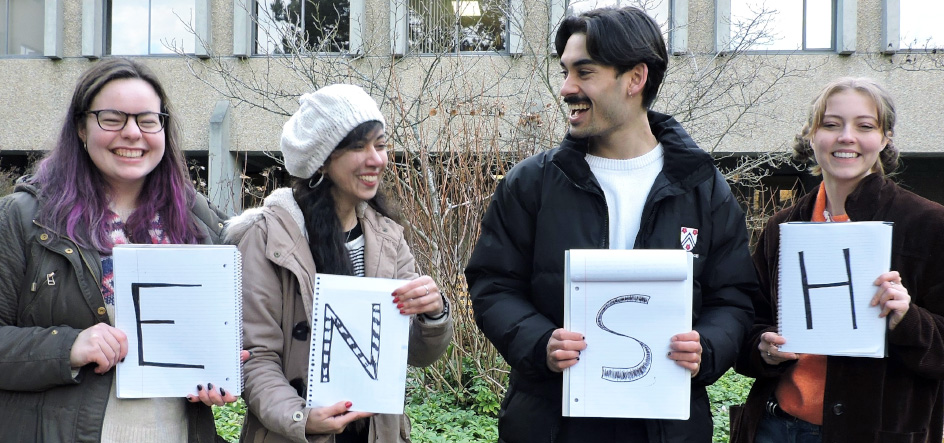The extensive update to the English program is the first in 30 years

Photo via UVic photo services.
Last month, UVic’s English department unveiled a new undergraduate curriculum. Students who started before summer 2023 have the option to continue with the old program (ENGL) or transfer their credits and upgrade to the new curriculum, titled ENSH.
While students’ course loads will stay the same, the main change is that the new curriculum includes fewer required courses, giving more freedom for students to pursue individual interests.
In an interview with the Martlet, Dr. Corinne Bancroft, English Curriculum Committee Chair and Assistant Professor at UVic, explained that it has been 30 years since the last full-scale revision of the curriculum. The department wanted the program to “reflect the kind of cutting edge scholarship that professors are actually doing.” They hope that this will make it “clearer to students how the skills and knowledge they gain in English classes can help them in future careers and life.”
The department has outlined three key changes: courses will now be labelled ENSH instead of ENGL, 25 new courses have been added including Coming of Age Novels, Speculative Fiction, and Narrative Worldmaking, and they’ve introduced small, research-focused 400-level capstone courses. Capstone courses are limited to majors and honours students except by permission of the instructor.
These unique capstone courses, Bancroft explained, “are designed to be a reward for students that finish the program.”
Professors will propose a topic that interests them, then students will choose an idea relevant to the course and undertake their own research. For example, in the spring, Bancroft will be teaching Advanced Theories and Methods on Critical Race Theory.
Additionally, the revised major program only has two required courses (ENSH 200 and one capstone), along with either ENSH 101 or 102, two lower-level courses, and nine upper-level courses. Major students no longer have to fulfill breadth requirements for literature from specific time periods and can instead pursue courses relevant to their research interests.
Emma Judd is a recent English graduate, who has mixed feelings about the program.
“I don’t know how I feel about them taking away the date ranges yet because I don’t think [they’re] necessarily a bad thing,” Judd told the Martlet, noting that they provide the opportunity to immerse themselves in a time period they might not have otherwise thought about. Judd also felt the program already offered some flexibility and “appreciated how there [were] a lot of courses that could fit in other departments.”
“I think if it was implemented halfway through and I had time to orient myself, I might’ve [considered switching] because I like the idea of a capstone course,” Judd said. “It almost seems like grad school [because] you’re much more supervised.”
However, Judd wishes the department encouraged co-op more. “I kind of did it of my own volition. I took a full year last year to do co-op and it felt like a really good decision because now I feel like I have a bit of background and a bit of knowledge of what I’m going to go into after [graduation].”
The update also includes changes to the English honours program, which is more intensive with additional required courses, including two capstones. Like the updated curriculum for the regular major program, it has fewer breadth requirements. Students will still take core courses like Practical Criticism, but have the space to pursue more of their own independent research.
Ella Reedman, a fourth year English Honours student, shared why she decided to upgrade to ENSH. “I do only have one semester left, but I had a lot of requirements that I just wasn’t interested in fulfilling,” said Reedman.“Under the new curriculum the requirements are less rigid, so … I can take English classes that I’m more interested in.”
Reedman acknowledged that switching to the new curriculum was not an easy decision initially. “At first, it was really scary because I am so close to graduating. I was pretty terrified that I was going to be set back.”
One concern raised was the limited options for capstone courses. The department is offering two capstone options in the fall term and three in the spring term.
“I want the department to be really transparent about what’s going to be in those capstone courses,” Reedman said. “They are supposed to be the capstone of our entire degree, so I want to know what I’m going to be covering, what I’m going to be doing, and if I’ve touched [on] those things before.”
According to Bancroft, capstone courses are determined based on the number of declared English majors and honours students.
“Because students can choose to follow the new ENSH program requirements or stick with the old ENGL requirements, we anticipated having fewer major and honours students who would need to take the capstone course this year than we will in the future.” Bancroft continued, “As more and more students follow the ENSH program, we will offer more and more capstone courses.”
To help offset the restricted number of capstone courses, the department also welcomes English students to enrol in graduate courses to fulfil the capstone requirement.
Ultimately, talking to professors in the program and her advisor was essential to Reedman’s decision to go through with the ENSH curriculum.
Other than the changes to the major and honours programs, the minor English program now only requires one first year course, three 200-level courses, and six 300-level courses. The professional communication minor requires two of lower level courses, ENSH 302: Copy Editing, and five upper-level professional communication courses.
According to Bancroft, the upgraded curriculum will provide more flexibility overall, enabling students to “design their pathway through the program.”






